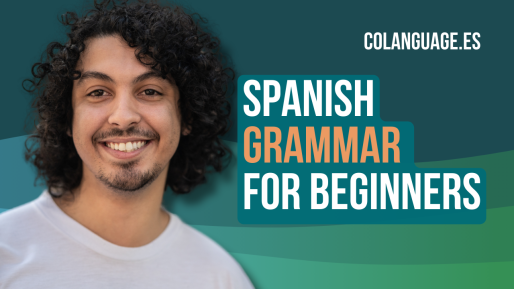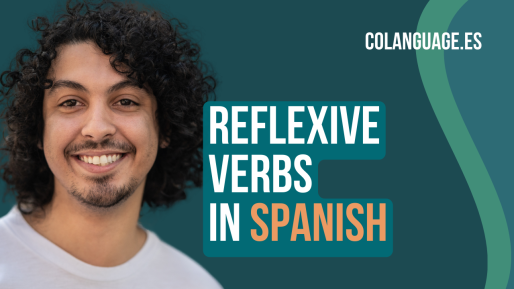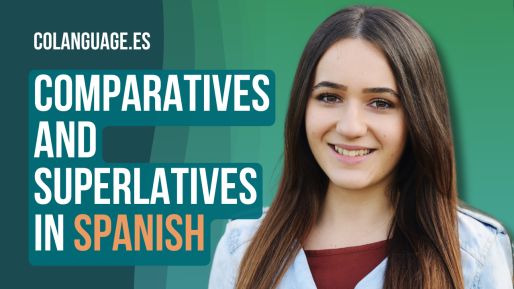Conditional tense in Spanish: when to use and how to form Share Copied!
Spanish
Hi and welcome! In this lesson, we are going to learn about the conditional tense in Spanish.
Video
Podcast
What is the conditional tense?
The conditional tense is often used alongside "if" clauses to express hypothetical situations, but it can also be used alone to express desires, wishes or polite requests, without the explicit use of "if".
- Si tuvieras más tiempo, estudiarías más. (If you had more time, you would study more.)
- Me gustaría un café, por favor. (I would like a coffee, please.)
- Ellos viajarían por el mundo si tuvieran suficiente dinero. (They would travel the world if they had enough money.)
Use cases of the conditional tense in Spanish
A first use case of the conditional is when talking about something you would like to do or wish for.
| Spanish | English |
|---|---|
| Me gustaría viajar a España el próximo año. | I would like to travel to Spain next year. |
| Comería helado todos los días si pudiera. | I would eat ice cream every day if I could. |
| Leeríamos más libros si tuviéramos más tiempo libre. | We would read more books if we had more free time. |
The conditional in English usually translates to "would" or "could", or sometimes "should".
We also use the conditional to make polite suggestions and requests.
| Spanish | English |
|---|---|
| ¿Os importaría llegar antes a la cita? | Would you mind arriving earlier to the appointment? |
| Podríamos probar ese nuevo restaurante vasco. | We could try that new Basque restaurant. |
Notice how sometimes the conditional is combined with the infinitive of other verbs.
¿Te gustaría visitar el museo de arte moderno? (Would you like to visit the modern art museum?)
Now, let’s see some examples giving advice using the conditional.
| Spanish | English |
|---|---|
| Si fuera tú, hablaría con él sobre tus sentimientos. | If I were you, I would talk to him about your feelings. |
| Deberíais hacer ejercicio más a menudo. | You should exercise more regularly. |
| Si tuvieras una dieta equilibrada, te sentirías mejor. | If you had a balanced diet, you would feel better. |
Finally, we use the conditional when talking about what we would do in a specific situation.
| Spanish | English |
|---|---|
| Les dije a mis vecinos que les ayudaría. | I told my neighbours that I would help them. |
| Ayer me confirmaron que me darían el puesto de trabajo. | Yesterday they confirmed that they would give me the job. |
| Le dijimos que la llamaríamos antes de cenar. | We told her that we would call her before dinner. |
Forming the conditional tense of regular verbs in Spanish
In this paragraph, we are going to learn the conjugation of regular verbs using the conditional tense.
| Personal pronoun | Spanish | English |
|---|---|---|
| Yo (I) | Yo viajaría por todo el mundo si tuviera la oportunidad. | I would travel around the world if I had the opportunity. |
| Tú (You) | Tú leerías más libros si tuvieras más tiempo libre. | You would read more books if you had more free time. |
| Él/Ella (He/She/It) | Él aprendería a tocar la guitarra si practicara todos los días. | He would learn to play the guitar if he practised every day. |
| Nosotros/-as (We) | Nosotros visitaríamos a nuestros amigos si viviéramos más cerca. | We would visit our friends if we lived closer. |
| Vosotros/-as (You) | Vosotros cocinaríais una deliciosa cena si tuvierais los ingredientes necesarios. | You would cook a delicious dinner if you had the necessary ingredients. |
| Ellos/-as (They) | Ellas bailarían en el escenario si fueran seleccionadas para el espectáculo. | They would dance on stage if they were selected for the show. |
To form the conjugation of regular verbs in Spanish, take the infinitive and add the conditional endings. It’s an easy tense to conjugate, because the endings are all the same for "-ar", "-er", and "-ir" verbs.
Listening exercise
| Spanish | English | |
|---|---|---|
| Daniel | ¿Qué comprarías si ganaras la lotería? | What would you buy if you won the lottery? |
| María | Compraría una casa en la playa y viajaría por el mundo. | I would buy a house on the beach and travel around the world. |
| Daniel | ¡Qué bien suena eso! Yo estudiaría medicina si tuviera la oportunidad. | How great that sounds! I would study medicine if I had the opportunity. |
| María | Si fueras médico, ayudarías a mucha gente. | If you were a doctor, you would help a lot of people. |
| Daniel | Sí, sería muy gratificante. | Yes, it would be very gratifying. |
Remember to always add an accent on the "í" when conjugating the conditional.
Conditional tense of verbs with irregular stems in Spanish
This last part focuses on the conjugation of irregular verbs in Spanish when using the conditional tense.
| Personal pronoun | Spanish | English |
|---|---|---|
| Yo (I) | Saldría a correr todos los días si tuviera más tiempo libre. | I would go for a run every day if I had more free time. |
| Tú (You) | ¿Querrías viajar por el mundo si pudieras? | Would you want to travel the world if you could? |
| Él/Ella (He/She/It) | Ella pondría más esfuerzo en su trabajo si le ofrecieran un aumento. | She would put more effort into her job if they offered her a raise. |
| Nosotros/-as (We) | Nosotros habríamos ganado el partido si nuestro portero no se hubiera lesionado. | We would have won the match if our goalkeeper hadn't gotten injured. |
| Vosotros/-as (You) | ¿Haríais una sesión de fotos si el fotógrafo estuviera disponible? | Would you do a photo shoot if the photographer was available? |
| Ellos/-as (They) | Ellos vendrían a visitarnos si viviéramos más cerca. | They would come to visit us if we lived closer. |
To form the conditional of irregular verbs, use the same stem as for the future tense, then add the usual ending for the conditional.
Listening exercise
In the following exercise, we will practise the conditional tense of irregular verbs.
| Spanish | English | |
|---|---|---|
| María | ¿Qué harías si tuvieras la oportunidad de cambiar de trabajo? | What would you do if you had the chance to change jobs? |
| Daniel | Saldría de mi zona de confort y buscaría algo que realmente me apasione. | I would step out of my comfort zone and look for something that truly inspires me. |
| María | ¿Y qué pondrías en práctica si pudieras elegir una nueva habilidad? | And what skill would you put into practice if you could choose one? |
| Daniel | Querría aprender a hablar un idioma nuevo. | I would like to learn to speak a new language. |
| María | Es emocionante pensar en las oportunidades que podrían venir en el futuro. | It's exciting to think about the opportunities that could come in the future. |
Reflexive verbs in conditional tense
When using reflexive verbs in the conditional, the order in the sentence is important.
| Reflexive pronoun | Spanish | English |
|---|---|---|
| Me (I) | Me levantaría temprano si tuviera un horario estable. | I would wake up early if I had a stable schedule. |
| Te (You) | Te relajarías más si practicaras yoga. | You would relax more if you practised yoga. |
| Se (He/She/It) | Si mi hermana hiciese más ejercicio, se sentiría mejor. | If my sister did more exercise, she would feel better. |
| Nos (We) | Si escucháramos más, nos comunicaríamos mejor. | If we listened more, we would communicate better. |
| Os (You) | Os veríais mejor si cuidarais vuestra piel. | You would look better if you took care of your skin. |
| Se (They) | Nuestros hijos se llevarían mejor si discutieran menos. | Our children would get along better if they argued less. |
We place the reflexive pronoun before the verb.
Listening exercise
Let's practise reflexive verbs using the conditional tense in a listening exercise.
| Spanish | English | |
|---|---|---|
| María | Si tuvieras un día libre perfecto, ¿qué te gustaría hacer? | If you had a perfect day off, what would you like to do? |
| Daniel | Me levantaría tarde y luego me relajaría con un buen libro. | I would wake up late and then relax with a good book. |
| María | Eso suena maravilloso. Me encantaría disfrutar de un día así contigo. | That sounds wonderful. I would love to enjoy a day like that with you. |
| Daniel | A mi también. Nos sentiríamos muy descansados después de un día así. | Me too. We would feel very rested after a day like that. |
Key takeaways
Here is a quick summary of this lesson.
- You use the conditional tense to express hypothetical or conditional situations, but also to express desires, wishes, advice or polite requests.
- To conjugate the contitional take the infinitive and add the conditional endings, which are all the same for "-ar", "-er", and "-ir" verbs.
- Irregular verbs in the conditional tense use the same stem as for the future tense.
Subscribe to our social media channels to get free daily exercises!



